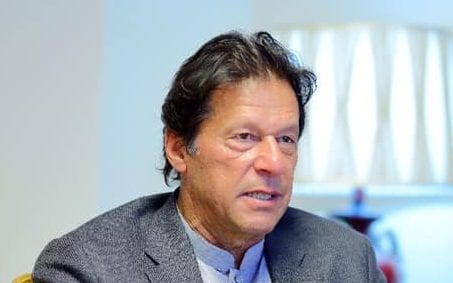
Behind Hafiz Saeed’s arrest is Imran’s dream of friendship with Trump

In his playboy days, also referred to as his Oxford nights, Imran Khan was derided by critics as ‘I’m the Dim,’ in what was apparently a cruel dig at his intellect.
On his part, the Pathan from Pakistan didn’t hesitate in pointing out where his real interests lay by strutting around in T-shirts emblazoned with a suggestive message: Big boys play at night. When Khan entered politics, not many gave him an outside chance in a milieu dominated back then by the Bhuttos, the Sharifs, and the not-so-sharifs (upright) — the Pakistani Deep State and the army.
After a series of blunders, failed attempts at elections and bloodless coups, and soft corners for hardliners that earned him the moniker of Taliban Khan, he seemed destined to a life of mediocrity in politics. But, as prime minister of Pakistan, Imran Khan has been a pleasant surprise, at least for India.
His renaissance is underlined by three recent decisions, taken one after the other, that are likely to appease the US, bring down tensions with India, and position him as a peacenik ready to act as a statesman. On Wednesday (July 17), in a surprise move, the Pakistan government arrested JuD chief and terrorist Hafeez Saeed.
Also read: Mumbai terror attack mastermind and JuD chief Hafiz Saeed arrested
According to reports, Saeed was arrested in a terrorism financing case on his way from Lahore to Gujranwala. Punjab (Pakistan) chief minister’s spokesman Shahbaz Gill told news agency Reuters that Saeed was arrested on charges of gathering funds for banned outfits, which is illegal.
India has been demanding that Saeed — a UN-designated global terrorist and founder of the banned outfit Lashkar-e-Taiba — be arrested and handed over for trial in the 26/11 attack on Mumbai. A day earlier, Pakistan decided to open its airspace for civilian aircrafts after keeping them closed for almost three months since Indian war planes entered crossed the Line of Control to target terror camps in Balakot, a town in its Khyber Pakhtunwa province.
Before this, on July 12, the Pakistani government addressed India’s concerns over the Kartarpura corridor by removing from its shrine management committee alleged supporters of Khalistan. India had objected to their inclusion by expressing fears that separatists may be allowed to visit India on the pretext of pilgrimage.
Also read: Pak trying to hoodwink international community on Hafiz Saeed: MEA
Three decisions within a week to appease India is an unprecedented gesture from Pakistan, especially considering its earlier recalcitrance on these issues. So, what’s going on?
The biggest factor behind Pakistan’s peace overtures to India is Khan’s maiden visit to the US with his army chief scheduled later this month. Khan is expecting Donald Trump to tone down his rhetoric against Pakistan — the US president recently accused it of deceit and doublespeak — and consider his proposal for continuous engagement with the Taliban for stabilising Afghanistan.
To prepare the ground for the visit, Khan is taking steps that make him seem like a real peacenik interested in creating an environment where India and Pakistan can resume dialogue and the US can hope for peace in Afghanistan, a pre-condition for its withdrawal from the troubled country. The Pakistani media believes that Khan has managed to mend ties with the US with his straight-talk on Afghanistan.
He has, Pakistani critics say, convinced Trump that the US can withdraw from Afghanistan only by engaging the Taliban. This viewpoint is validated by the US decision to not suspend talks with the Taliban in spite of terror attack by the outfit in Afghanistan.
In essence, Khan has succeeded in opening a line with the US. By conceding to demands from India, he is trying to further endear himself to Washington and position himself as a leader ready to go out of his way to mend ties with neighbours.
Also read: Pak books Hafiz Saeed, 12 others for terror financing through charities
Khan’s metamorphosis from a rabble-rouser who laid siege to Islamabad with the help of a cleric a few years ago and a politician with a soft corner for hardliners to a statesman ready to give peace a chance will be a different challenge for India. In case Khan manages to convince Washington that his intentions are honest, India would find it difficult not to respond in kind.
For a government that finds it easier to deal with Pakistan’s aggression, and unwillingness to address the contentious issue of cross-border terrorism, Khan’s new, improved version would require some imaginative deviation from its current muscular Pakistan policy.
‘I’m the Statesman’ is playing some bold shots. This time in broad daylight. India will have to react accordingly.
Jamaat-ud-Dawa (JuD)'s chief Hafiz Saeed arrested and sent to judicial custody pic.twitter.com/qU8Ts1RNyG
— ANI (@ANI) July 17, 2019

